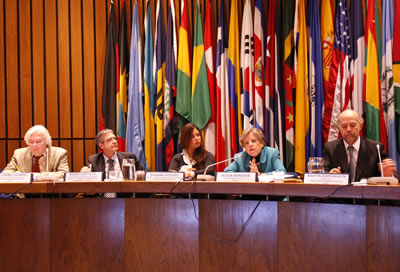Experts Highlight the Importance of Using ICT in Education for Achieving More Equal Societies
Education is one of the fundamental assets for achieving an equal development, stated Alicia Bárcena, Executive Secretary of this UN body.

(26 April 2012) The application of information and communication technologies (ICT) in education is a key factor for achieving more inclusive societies and reducing inequalities, said experts gathered today at the Economic Commission for Latin America and the Caribbean (ECLAC) headquarters in Santiago.
During the seminar La tecnología digital frente a los desafíos de la educación inclusiva en América Latina. Algunos casos de buenas prácticas (Digital technology facing the challenges of inclusive education in Latin America. Some cases of good practices), international specialists will analyze for two days the results of eight studies on good practices for the use of ICT in the education sector in the countries of the region, and will debate on related future challenges.
The seminar is organized by the e-education component of the ECLAC Social Development Division, as part of the ECLAC@LIS2 Project - Dialogue for the Information Society, co-financed by the European Commission.
Today, the meeting was inaugurated by the Executive Secretary of ECLAC Alicia Bárcena, who said that education is one of the fundamental assets when seeking to achieve equal development and, when guided by the principles of equality and quality, it constitutes the most important social inclusion mechanism from one generation to the next.
"Significant results have been achieved in the region in the last decades; yet there are still gaps to close", she commented. "The first digital gap has been reduced, that of access to ICT - not without differences among countries, but it is necessary to advance in order to close the second digital gap: the one related to the effective use of technologies for education," she continued.
On this last topic, Bárcena said that it is fundamental to advance on the development of the competences and capacities necessary to benefit from the use of ICT, as well as on the infrastructure required to access broadband, considered by ECLAC as a global public asset that needs to be available to all.
"Public policies are essential to achieve the incorporation of ICT into education. The main challenge is to move forward in renewing and innovating these policies," she emphasized.
The so-called "digital economy" is growing rapidly. It represents 4% of the gross domestic product (GDP) of the 20 largest economies in the world, that is, nearly US$ 2.3 trillion and grows at rates superior to 10% a year. By 2015, there will be 2 billion Internet users with 2.7 billion broadband connections, 67% of which will be located in emerging markets and 80% will be mobile connections.
The representative of the Delegation of the European Union in Chile, Susana Agüero, said that in the framework of the @LIS cooperation programme - Alliance for the Information Society - in Latin America, the three main priorities which will help close educational and social weaknesses in the region will be quality, equality and efficiency.
"The strategy of change that will be implemented to promote the inclusion of marginalized social groups should not only guarantee access to an adequate ICT infrastructure, but also to other key elements such as models for a pedagogical use of ICT in teacher training programmes; it should also promote strengthening monitoring systems for assessing the impact of such policies and programmes on the education system, among others," she concluded.
At the seminar, renowned experts from Argentina, Brazil, Chile, Colombia, Costa Rica, Mexico, Panama and Uruguay will give lectures on digital technologies related to education and educational policies, together with former directors of national programmes on educational informatics and two former ministers.
For further questions, please contact ECLAC's Public Information and Web Services Unit: dpisantiago@cepal.org ; Tel.: (56 2) 210 2040.
Country(ies)
- Latin America and the Caribbean
Contact
Public Information Unit
- prensa@cepal.org
- (56 2) 2210 2040